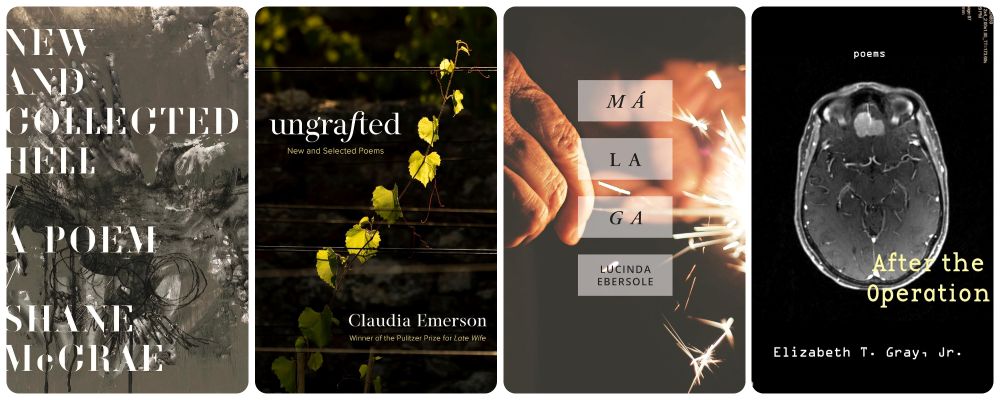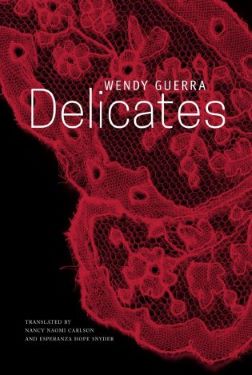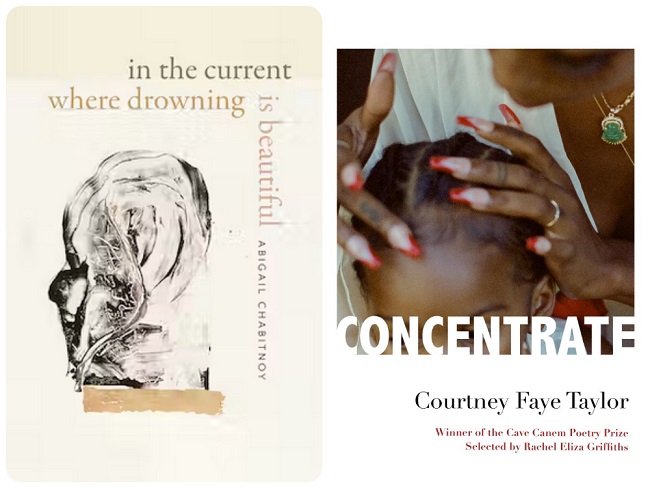New collections to make life more lyrical.

Shane McCrae’s New and Collected Hell (Farrar, Straus and Giroux) begins with a reworking of “The Hell Poem,” a sequence from his 2017 The Gilded Auction Block. That collection was a blistering commentary on racism during Donald Trump’s first term. In the era of Trump, Act II, “The Hell Poem” reads a bit differently, and in this book, it is bundled with a new sequence, “The Hell Poem DLC.”
It begins with our narrator’s “Intake Interview.” Lost in a dark wood, he finds his way to a lake and rows across, isolated from but nevertheless surrounded by others. Isolation is the first indication that he’s on his way to hell.
All at once, he’s spiraling downward, while images of those he’s wronged are projected before him. But the real hell starts when the sense of the harm he’s done disappears, and he disappears with it.
McCrae’s underworld is a hellscape for our times, a nightmarish videogame environment complete with Transformers and Decepticons and a vulgar robot bird named Law as his guide. Law spews mockery as bodies are shoveled through a tiny portal with a red toy spade:
It’s mostly assholes who think Hell’s where justice happens Hell
Is sorrow’s Heaven where it goes to live forever with
Its god the human body
Things pixilate, squeeze, and recombine. A screen flashes images of grey cubicles where the damned are tortured, while static roars with their screams. The narrator’s body liquifies then tightens back together:
My wet parts recombining sounded
Just like paint splattering as if
My body I had been was shaped
By chaos hidden in the bone
I wondered how much of this I could stomach. But the authority of the voice, the relentless iambic and sprung rhythm, kept me riveted. I imagined David Byrne from the Talking Heads narrating this nightmare — or was it a wakeup call or, as for Dante, a journey of self-discovery? In any case, the only way out was through.
Finally, in “The Dream at the End of the Dream,” Law metamorphosizes like the T-1000 shapeshifter into a silver man with insight into humankind’s condition:
the fire and ice
Are you and I and I and you
And each is each we are the same
Rock burning and we freeze together
And burn and freeze beside each other
Separately also neither when
We rise together nor when we
Fall separately do we know
Each other neither in our sorrow
Burning freezing nor in our
Joy when we reach the peak and are
Released to joy and so we burn
And freeze forever on a wheel
That’s Hell we’ve been in Hell
McCrae’s voice demands to be heard. An observation from Anthony Loyd’s 1999 memoir, My War Gone By, I Miss It So came to my mind. If you want the raw truth about an atrocity, he said, you’ll always get it from an eyewitness who hasn’t had time to compose his story into a sensible narrative.
That’s the kind of voice McCrae has managed to channel in this brilliant and terrifying book. It speaks to the vulgarity and cruelty of our times, warning us, if only we will listen, to step away from the abyss and recognize ourselves in others.
*****
Claudia Emerson served as Virginia’s poet laureate from 2008-2010. In 2006, she won the Pulitzer Prize for Late Wife, which explored the end of her first marriage and the legacy of her second husband’s late wife, who died of cancer. How poignant then, and unbearably sad, that Emerson should also die of cancer at the age of 57.
Ungrafted: New and Selected Poems (LSU Press) showcases her work from eight collections, along with some two dozen previously unpublished pieces. Emerson’s subtle vignettes usually concern people alone with memories and secrets, and in the case of her posthumous collection Impossible Bottle, with illness.
Pain and passion are often kept private, as demonstrated in her poem “Lock.” Here, visitors to an Emily Dickinson exhibit speculate on the life of this famously reclusive poet — “The hour of lead, at last, unlocked.” Except it isn’t unlocked. In the final verse, as visitors examine a lock of Dickinson’s hair:
...while they can never
get close enough, they will never be any
closer than this to what it does not tell them,
and they are desperate for all that that might mean.
Emerson has a facility for making the inner lives in her subjects palpable. In “Swimming Alone,” she takes us to a farm pond where she used to swim with a friend who is now dying. Finding herself alone, she reflects:
there is selfish comfort
in knowing she is doing thisthing before me, the way
she is in the middle
of the pond before I
can get there, not facing the dock,
not waiting for me,
but away, consideringthe other bank
The present moment is often suffused with an unresolved past. In another poem, a widow lies awake in bed, while the scarecrow outside wears her old nightgown underneath her late husband’s hunting jacket. The crows “have lost all caution,” but she isn’t listening to them. Rather, to “the faint fork/of the creek winter narrowed but quickened,/and the fainter but fevered keening of dogs/somewhere, scent-pitched, bodiless as though distance/itself had a voice and desire.”
In another piece, a war veteran works the night shift at a cotton-sheeting factory, a shift he prefers because:
It was easier to bear what no one else wanted —
A world just lightening when his shift ended, the river
they all crossed running with the night’s dye
But just as the present is infused with memory, so the future looms over it. In another poem, after her cancer diagnosis, she asks her husband what he’s thinking. In the exchange that follows, she senses she has “fallen away then from the present tense into reminiscence — the lucid was.”
There’s a quiet profundity in Claudia Emerson’s work, and it’s beautifully crafted. Nothing gimmicky here. Ungrafted is a treasure of a book and a fitting retrospective of one we lost too soon.
****
Málaga by Lucinda Ebersole (Paycock Press) is an enticing little hybrid of a volume. Ebersole died in 2017. In 1998, she described the unpublished manuscript of Málaga as “kind of poetry, kind of a novel.” Each page is a numbered chapter — or, if you will, a prose poem.
We begin with the speaker taking a train to Málaga, Spain, to visit Jane Bowles’ grave. Disappointed by the neglected cemetery, she takes refuge at an outdoor café to read a book and sample the local beer. She subsequently becomes sexually involved with a couple at the next table. It has a surrealist quality, and sure enough, later on:
Cocteau whispers in my ear “A true
poet rarely bothers about poetry. Does a
gardener perfume his rose.”
Threading through the narrative is the theme that she is a Pisces. “I am a Pisces therefore I am,” she writes.
As the story progresses, we discover that her lover is a bullfighter (and a Taurus, no less) whose influences range from Cervantes to Billie Holiday. But she often sends herself up:
Henry & June,
Edith and Marcel.
Jules et Jim
One day they will make a movie about
our lives. In the movie version, I will feed
him milk and honey from shiny gourds.
The thick cream dribbling down his chin
onto his chest. An aphrodisiac from
antiquity.
Towards the end, there’s a bullfight with a dizzying number of shifting points of view, like a Jodorowsky film, with references to Picasso, Christ, and Pythagoras. But the fever-dream quality becomes exhausting. Reading this book is a bit like getting too high. After a while, you long for sobriety.
I wish I could have met this author because she sounds marvelous. She worked in film, moved her bookshop from U Street in Washington, DC, to Del Ray in Alexandria, Virginia, and later, in an online auction, purchased a town in West Virginia with many acres of farmland. Her archive includes thousands of books, cake boxes, and antique cooking equipment.
I’m glad Málaga made it into print. It’s fun to peruse and has a charming, compact design. But a little bit of Málaga goes a long way.
*****
Anyone who enjoyed A Journey Round My Skull by Hungarian poet Frigyes Karinthy will be intrigued by Elizabeth T. Gray Jr.’s After the Operation (Four Way Books). Karinthy’s memoir chronicles his strange experience with a brain tumor. Gray’s book deals with the perceptual distortions experienced after the removal of a brain tumor.
We switch from the doctor’s clinical point of view to poems capturing her altered inner state. Occasionally, she shifts into third person, as though, like an astral projection, she is loosened from her physical experience and entering another reality.
The senses are scrambled, perhaps even augmented with new ones. She describes birds, feathery sounds, smells of woodsmoke and fresh mountain air. She examines her shaved scalp for pinfeathers, and at one point, sherpas appear. Hospital visitors and nurses come and go while other chunks of experience go missing. Is the part extracted from her brain conscious of her, she wonders.
The surgeon’s notes make less sense as we embark on a journey inside her skull, into a kind of pharaoh’s tomb. She’s stuck in the aftermath of the operation, until gradually some of the otherworldly consciousness evaporates and the poems become more direct.
It’s as though the tumor contains another version of her, with its own memories. The tumor has also made off with her senses of taste and smell. She writes towards the end:
(The terror
had been on the same ferryIt disembarked in the sun
under the wheeling gullsIt had been photoshopped out
of my birthday but there it wason the quay, carrying
in its briefcasehow it had really been,
demanding we talkIt handed me an envelope
with its credentials: the momentsI had carefully avoided
and its list of deleted scenes)
Two years on, she asks:
(If we met again, my tumor
and I, in the layers of another liningwhat would we say to one another
Would an apology be in order)
But, according to the doctor’s final assessment, everything went splendidly. He notes what a pleasure it was seeing her and mentions in passing that “she does not feel that her normal olfaction has returned.”
How can consciousness and selfhood part ways? In fact, what does it mean to be yourself? After the Operation is a fascinating exploration of the layers of self and the extent to which we can become untethered from our normal states of awareness. Or, at least, from what we used to think was normal.
Amanda Holmes Duffy is a columnist and poetry editor for the Independent and the voice of “Read Me a Poem,” a podcast of the American Scholar.

